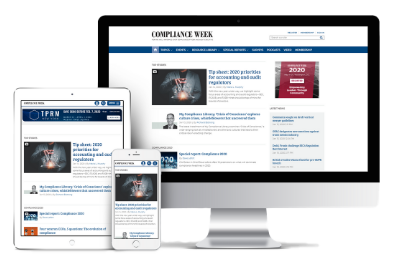- Home
- About CW
-
Topics
- Back to parent navigation item
- Topics
- Accounting & Auditing
- AI
- AML
- Anti-Bribery
- Boards & Shareholders
- Culture
- ESG/Social Responsibility
- Ethics & Culture
- Europe
- Financial Services
- Internal Controls
- Regulatory Enforcement
- Regulatory Policy
- Risk Management
- Sanctions
- Surveys & Benchmarking
- Supply Chain
- Third Party Risk
- Whistleblowers
- Opinion
- Events
-
Webcasts
- Back to parent navigation item
- Webcasts
-
Upcoming webcasts
- Back to parent navigation item
- Upcoming webcasts
- May 13: Inside the Playbook: Institutional Approaches to Digital Asset Compliance
- May 20: Building A Whistleblower Program That Drives Real Outcomes
- May 22: The Compliance Practitioner Challenge: Staying Ahead of AI Regulations
- May 29: Creating TPRM Stability in an Unsettled World
- Research
- Membership
Highlights from Compliance Week 2023
By  Kyle Brasseur2023-05-22T13:40:00
Kyle Brasseur2023-05-22T13:40:00

Significant changes in policy and technology, in addition to fresh perspectives on tried-and-true compliance topics, highlighted the discussion at Compliance Week’s 2023 National Conference.
THIS IS MEMBERS-ONLY CONTENT
You are not logged in and do not have access to members-only content.
If you are already a registered user or a member, SIGN IN now.
Related articles
-
 Opinion
OpinionTen things I’m excited for at CW National 2024
2024-02-22T13:00:00Z By Kyle Brasseur
A new month and a new venue but a lot of the same you love about Compliance Week’s National Conference. CW Editor in Chief Kyle Brasseur shares what he’s looking forward to most at the 2024 edition of the annual event.
-
 Opinion
Opinion‘Ethics & Compliance for Humans’ highlights potential of profession
2023-10-16T15:58:00Z By Kyle Brasseur
Adam Balfour’s new book explains the benefits ethics and compliance programs designed with the human experience in mind can have on workplaces, communities, and the world at large.
-
 News Brief
News BriefSEC drops Morgan Stanley cash sweep case: Sign of the times?
2025-05-08T21:43:00Z By Aaron Nicodemus
A decision by the Securities and Exchange Commission to close an investigation into the cash sweep program at Morgan Stanley may affect decision-making at other financial institutions under similar scrutiny.
More from Opinion
-
 Opinion
OpinionWhy are CFOs struggling to stay compliant?
2025-03-11T14:37:00Z By Markus Hornburg, CW guest columnist
CFOs are tasked with overseeing an organization’s entire financial processes, not least ensuring that financial operations remain compliant with the multitude of global regulations. It’s a heavy burden to carry that might be alleviated slightly with the help of artificial intelligence, writes Markus Hornburg, head of compliance at Basware.
-
 Opinion
OpinionFive reasons why I’m excited about CW’s Cyber Risk & Data Privacy Summit
2025-01-30T16:32:00Z By Jeff Dale
Having worked for Compliance Week for three years, I’ve found it remarkable how compliance professionals can be so consistently upbeat about their plight. An often refrain in compliance circles is “be comfortable with being uncomfortable.” As difficult as the job can be, that clearly doesn’t mean it can’t be fun.
-
 Opinion
OpinionEricsson's 'integrity journey' post-FCPA settlement top compliance triumph of 2024
2024-12-24T13:45:00Z By Jeff Dale
It’s been a long “integrity journey” for Ericsson, according to the company’s Head of Compliance Global Affairs Alison Howell. Since settling with the DOJ over FCPA violations in 2019, the company has gone through a "business critical transformation," resulting in the end of its compliance monitorship.
- Terms and Conditions
- Privacy Policy
- Do Not Sell My Info
- © 2025 Compliance Week
Site powered by Webvision Cloud


